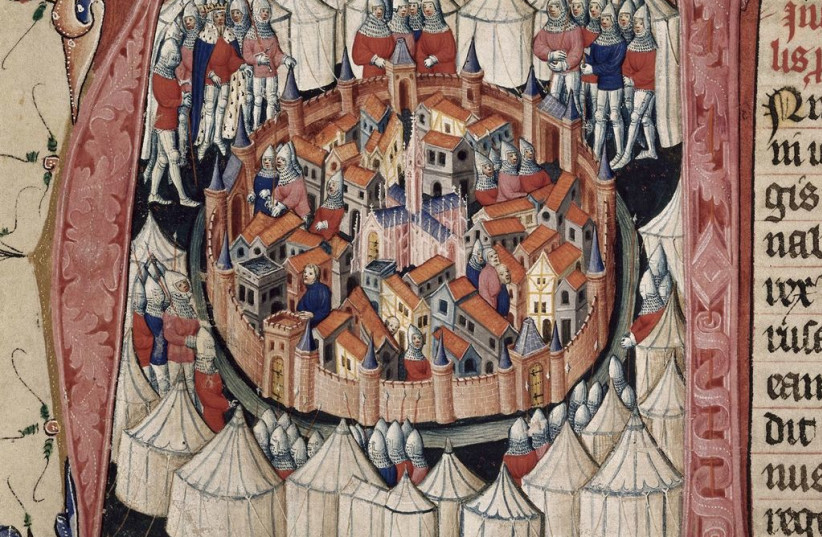December 14, 2021, marks the Jewish fast day known as the 10th of Tevet (Asara B'Tevet in Hebrew).
The holiday is celebrated annually on, as the name implies, the 10th day of the Hebrew month of Tevet, which typically falls in the winter for those in the Northern Hemisphere. It also always follows the eight-day long holiday of Hanukkah, though it is in no way related.
Here is a rundown of what you need to know about Judaism's winter fast day.
<br>History
The fast day is, like many others in Judaism, meant to commemorate the destruction of the Temple in ancient Israel. Specifically, it commemorates the day the Babylonian Empire, under the leadership of Nebuchadnezzar, laid siege to Jerusalem, which would ultimately lead to the destruction of the First Temple, the end of Jewish sovereignty in the Land of Israel and the beginning of the galut (exile, Diaspora) as Jews were forced to leave the land.
These events are described in the Book of Kings II in the Bible, taking place during the reign of King Zedekiah.

The fast itself is also biblical in origin, with a fast day in the month of Tevet being referenced in the Book of Zechariah, one of the 12 minor prophets.
However, there is a tradition in rabbinic Judaism, which is also highlighted in some of the prayers said on this day, that the fast is also meant to commemorate two other events that happened in other years during the preceding days.
On the eighth day of Tevet during the Second Temple period, Egypt's Hellenistic King Ptolemy had forced 72 sages to translate the Bible into Greek, a translation that became known as the Septuagint. According to legend, each sage was imprisoned separately and they all had to translate it by themselves, but miraculously, all 72 copies were identical.
However, this is seen as a bad thing, as many held that much of the important holy nature, meaning and authenticity was lost in translation. In fact, Chabad even goes so far as to compare the translation of the Torah into Greek to the incident of the Golden Calf, an act of blasphemy.
The ninth of Tevet is a bit more confusing. This is because, as noted in the Shulchan Arukh (Orach Chaim 580:1), something happened on the ninth of Tevet – but we don't know what it was.
Prayers, however, say otherwise. According to the selichot penitential prayers said for the 10th of Tevet, the ninth was the day when Ezra the Scribe, who brought many Jews back from exile and helped establish the Second Temple, died.
Nonetheless, this is thought by some to be a later addition, and it is still unclear what happened, though it is universally agreed that something did, in fact, occur.
But there is one other unique aspect of this holiday with a more recent history. In 2013, the Chief Rabbinate of Israel ruled that the 10th of Tevet would also be a day of mourning for all those who died in the Holocaust, and is considered the yahrtzeit for those whose dates of death are not known.
<br>Rules
The 10th of Tevet is considered to be one of the minor fast days. As such, it follows similar rules.
Like most fast days, the fast is from dawn till dusk, beginning early in the morning and ending as night rolls in. In fact, for those living in the Northern Hemisphere, it is also the shortest fast day of the year, due to the days being shorter in winter.
The day sees the use of traditional prayer additions for fast days, such as the prayer "Aneinu" during "Shmona Esrei" in the Shacharit (morning) and Mincha (afternoon) prayers. The "Avinu Malkeinu" prayer is also recited by the congregation, and "Tachanun" is omitted.
Slichot is also recited during Shacharit.
The Torah reading in both Shacharit and Mincha is from the Book of Exodus and the haftarah (read only at Mincha) is from the Book of Isaiah.
Further, in Israel, people are allowed to say kaddish for those who died in the Holocaust. Other traditional mourning practices are also observed, such as lighting memorial candles. The prayer of mourning, "El Malei Rachamim," is also said following Torah reading in Shacharit.
As a minor fast, the 10th of Tevet does not have the additional restrictions of the full fasts of Yom Kippur and Tisha Be'av, and some of the rules may be seen as more lenient. For example, pregnant and nursing women, even when not sick, are not required to fast, as noted in the Shulchan Arukh.
However, there is an aspect about it that makes it unique, in that, unlike all other minor fast days, the 10th of Tevet is the only one that will still be observed on a Friday.
This itself is a very rare occurrence, though it last happened in 2020 and will happen again in 2023.
<br>When does the fast begin and end?
Jerusalem
Fast starts: 5:19 a.m.
Fast ends: 4:59 p.m.
Tel Aviv
Fast starts: 5:21 a.m.
Fast ends: 4:56 p.m.
Haifa
Fast starts: 5:22 a.m.
Fast ends: 4:55 p.m.
Beersheba
Fast starts: 5:19 a.m.
Fast ends: 5:00 p.m.
US times are taken from MyZmanim
New York
Fast starts: 5:44 a.m.
Fast ends: 5:15 p.m.
Los Angeles
Fast starts: 5:30 a.m.
Fast ends: 5:26 p.m.
